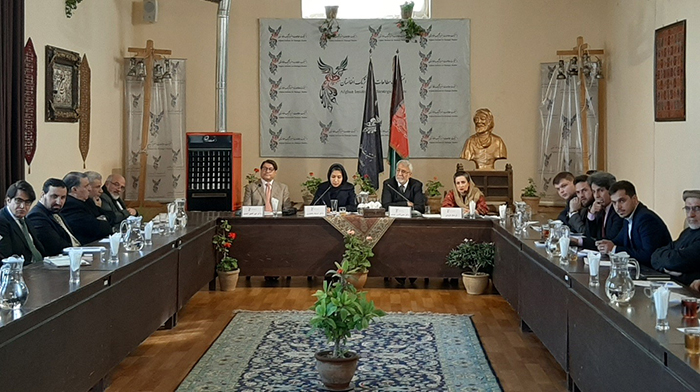A new study has found that ethnic power sharing has produced the opposite result and led to increased dissatisfaction and discrimination among different ethnic groups of Afghanistan.
The study which has been conducted by Afghanistan Institute of Strategic Studies (AISS) was released on Thursday, December 05, in Kabul.
The research study was conducted using qualitative method and collected opinions through in-depth interviews with various experts and government officials, high-level representatives of the 2019 presidential election teams, representatives of political parties, researchers, and members of the Independent Commission for Overseeing the Implementation of the Constitution, MPs, two participants of the Bonn Conference, participants of intra-Afghan talks in Moscow and Doha.
Speaking at the launching ceremony of the research study, Sediqa Bakhtiari, a researcher of the study, said that the ethnic power sharing, which was laid at the Bonn Conference, was unequal.
“The power, in the current political system, is centralized in the presidential palace and in the hands of ethnic leaders,” she claimed, adding that the citizens do not feel themselves in power.
The recent study titled “”Ethnic Groups and Distribution of Political Power in Afghanistan: Transforming or Changing the Political System in the Country” is aimed at reforming the current Afghan political system.
The study questions how the current constitutional political system (presidential system) has been successful in earning satisfaction of different ethnic groups over distribution of the political power.
Given the perceptions of the interviewees, the participants of the study are divided into pro-change and reformist groups regarding their attitudes towards the current political system. The two groups, however, have criticized the centralization of power in the presidential system and believe that the power is currently centralized in the presidential palace.
The reformists call for reforms in the current system and have said that Afghanistan is in a state of transition to democracy. They believe that decentralization of power could lead to a political crisis in the country.
Pointing out to the ethnic diversity of Afghanistan, pro-change interviewees say that the current system is not suitable for the country. Some of the pro-change respondents are preferring the parliamentary system while some others support maintaining the presidential system with three vice presidents.
The third group of pro-change respondents suggest the presidential system with having a chief executive body for resolving the issue of power sharing in Afghanistan.
According to some interviewees, the political power is solely shared among Afghanistan political elites (ethnic leaders). Some interviewees believe that political power is centralized and has come under the control of these political elites. “The power has not been distributed among citizens and ordinary people,” part of the research study notes, adding that the ordinary people do not have influence, presence, and role in the political power.
The study, however, says the lack of an accurate picture of the desired political system, the disagreement among the electoral teams about their favored system, limiting the interests of the ethnic groups to the interests of their leaders, emphasizing on ethnic quotas, limiting ethnic diversity to only four major ethnic groups (Pashtuns, Tajik, Uzbeks, and Hazara) and the lack of attention to the distribution of power between the center and neighboring areas are among the most important criticisms that this study has put forward for these groups.
The summary of this research on power sharing states: “Dividing [governmental] positions among ethnic leaders has not been the solution to the problem of power sharing. On the contrary, it has caused dissatisfaction among ethnic groups and their representatives,” the study states. “The public distrust and dissatisfaction cannot be restored without having a bottom-up power distribution.”
Finally, the study concludes that the solution to the problem of power sharing among ethnic groups in the country is not only in the political system.




